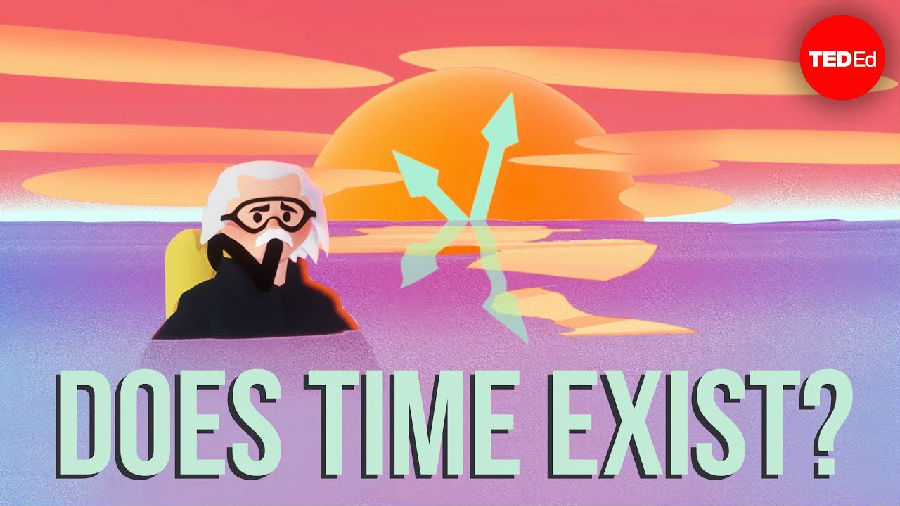(单词翻译:单击)
The earliest time measurements were observations of cycles of the natural world,
人类最初衡量时间的方法,就是观察自然世界的周期,
using patterns of changes from day to night and season to season to build calendars.
他们用朝暮之间和季节之间的变化模式来制作日历。
More precise time-keeping, like sundials and mechanical clocks, eventually came along to put time in more convenient boxes.
后来出现了更精确的计时方法,比如日晷、机械钟,让计时变得更方便。
But what exactly is it that we're measuring? Is time something that physically exists, or is it just in our heads?
但是,我们衡量的到底是什么呢?时间究竟是真正存在的一个物体,还是一个只在我们大脑中存在的概念?
At first the answer seems obvious -- of course time exists; it constantly unfolds all around us, and it's hard to imagine the universe without it.
乍看之下,答案似乎很明显:时间当然是存在的;它时时刻刻在我们周围流逝着,很难想象宇宙没了时间会变成什么样子。
But our understanding of time started getting complicated thanks to Einstein.
但是,我们对时间的理解因为爱因斯坦而变得复杂了。
His theory of relativity tells us that time passes for everyone, but doesn't always pass at the same rate for people in different situations,
根据他的相对论,每个人都会经历时间的流逝,但是时间流逝的速度随着场合的不同而变化,
like those travelling close to the speed of light or orbiting a supermassive black hole.
比如,速度将近光速的人,或者绕着巨大黑洞打转的人。
Einstein resolved the malleability of time by combining it with space to define space-time, which can bend, but behaves in consistent, predictable ways.
爱因斯坦解决了时间可塑性的问题,他把时间和空间结合起来,定义了时空的概念,时空可以转弯,但它表现得一致且可预测。
Einstein's theory seemed to confirm that time is woven into the very fabric of the universe.
爱因斯坦的理论似乎证实,时间是贯穿在宇宙的结构中的。
But there's a big question it didn't fully resolve: why is it we can move through space in any direction, but through time in only one?
但是有一个重要问题是它没能完全解决的:为什么我们在空间里可以往任何方向移动,在时间里却只能往一个方向移动呢?
No matter what we do, the past is always, stubbornly, behind us. This is called the arrow of time.
不管我们做什么,过去永远都已经成了过去。这个现象叫做“时间之箭”。
When a drop of food coloring is dropped into a glass of water,
如果把一滴食用色素滴进一杯水,
we instinctively know that the coloring will drift out from the drop, eventually filling the glass.
我们本能地就知道色素会从那一滴里渗透出来,最终把整杯水染色。
Imagine watching the opposite happen. Here, we'd recognize time as unfolding backwards.
想象一下相反的情况发生。我们会意识到,时间正在往反方向进行。
We live in a universe where the food coloring spreads out in the water, not a universe where it collects together.
在我们这个宇宙中,食用色素会在水中扩散,而不会聚集在一起。

In physics, this is described by the Second Law of Thermodynamics, which says that systems will gain disorder, or entropy, over time.
这个原理在物理学中叫做热力学第二定律:每个系统会随时间失去秩序,或者说,系统的熵会增加。
Systems in our universe move from order to disorder, and it is that property of the universe that defines the direction of time's arrow.
我们宇宙中的系统会从有秩序变得无秩序,正是宇宙的这个属性,定义了时间之箭的方向。
So if time is such a fundamental property, it should be in our most fundamental equations describing the universe, right?
那么,既然时间是个如此基本的属性,它就应该出现在形容宇宙的最基础方程式中,不是吗?
We currently have two sets of equations that govern physics.
目前,物理学有两套方程式控制着。
General relativity describes the behavior of very large things, while quantum physics explains the very small.
广义相对论形容的是巨大物体的行为,量子物理学解释的是微小物体的行为。
One of the biggest goals in theoretical physics over the last half century has been reconciling the two into one fundamental "theory of everything."
理论物理学这半个世纪以来的最大目标之一,就是把两者协调起来,形成一个根本的“万物理论”。
There have been many attempts -- none yet proven -- and they treat time in different ways.
已经有许多人尝试这么做,却没有一个理论已被证实,而且它们处理时间的方法都不一样。
Oddly enough, one contender called the Wheeler-DeWitt equation, doesn't include time at all.
奇怪的是,有一个叫做惠勒-德维特方程式的理论,居然不把时间包含在内。
Like all current theories of everything, that equation is speculative.
就像所有万物理论一样,这个方程式只是猜测而已。
But as a thought experiment, if it or a similarly time-starved equation turned out to be true,
但是,作为思想实验,如果这类不包含时间的方程式正确的话,
would that mean that time doesn't exist, at the most fundamental level?
是不是代表时间在最根本层面上是不存在的呢?
Could time just be some sort of illusion generated by the limitations of the way we perceive the universe?
我们是不是因为对宇宙的感知受到限制,才会产生时间的幻觉?
We don't yet know, but maybe that's the wrong way of thinking about it.
我们目前仍不清楚,但是这种想法可能是错误的。
Instead of asking if time exists as a fundamental property, maybe it could exist as an emergent one.
与其探讨时间是不是基本属性,倒不如探讨它是不是涌现性属性。
Emergent properties are things that don't exist in individual pieces of a system, but do exist for the system as a whole.
涌现性属性不存在于一个系统的个别部分,但是它存在于该系统的整体。
Each individual water molecule doesn't have a tide, but the whole ocean does.
个别水分子是不会产生潮汐的,但整个海洋会有潮汐。
A movie creates change through time by using a series of still images that appear to have a fluid, continuous change between them.
一部电影呈现时间流逝的方法,就是利用一系列静止图像,而这些图像之间似乎有着流通、持续的变化。
Flipping through the images fast enough, our brains perceive the passage of time from the sequence of still images.
如果图像的翻看速度够快的话,我们的大脑就会从静止图像的顺序感测出时间的流逝。
No individual frame of the movie changes or contains the passage of time, but it's a property that comes out of how the pieces are strung together.
电影中的个别画面都不会变化,而且也不包含时间的流逝。但是时间的属性来自于一系列画面之间的串连。
The movement is real, yet also an illusion. Could the physics of time somehow be a similar illusion?
电影中的动作是真实的,但也是虚幻的。在物理学上,时间是不是同样也是幻觉呢?
Physicists are still exploring these and other questions, so we're far from a complete explanation. At least for the moment.
物理学家还在探讨这类问题,要得到完整的解释,还要等上好久,至少以目前来看是这样。


